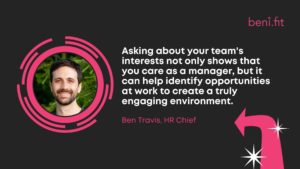What is one thing that great managers do to engage employees?
To help you best manage your employees through meaningful engagement, we asked HR managers and business leaders this question for their best insights. From having frequent one-on-one check-ins with employees to investing in employees to excel, there are several things that great managers are expected to do to foster effective engagement with their employees at all times.
Here are eight things these leaders do to engage their employees:
- Have Frequent One-on-One Check-ins With Employees
- Ask for Employee Feedback Regularly
- Create a Sense of Community and Empower Employees to Grow
- Know and Care About Employees’ Interests
- Make Employees Feel a Sense of Belonging
- Prioritize Consistent and Frequent Communication
- Build and Establish Relationships Beyond Work
- Invest in Employees to Excel
Have Frequent One-on-One Check-ins With Employees
One thing that great managers do to engage employees is to make sure that everyone feels like they’re a part of the team. One way to do this is to ensure that everyone understands the company’s goals and how their work fits into the big picture. When employees feel like they’re a part of something larger, they’re more likely to be engaged and motivated to do their best work.
Another great thing managers do is to schedule 30 minute one-on-ones to check in on their big wins, any struggles they had and their development. This allows for clear communication and the ability to set expectations. If an employee feels like their manager is invested in them, they’re more likely to be engaged in their work. Creating a positive work environment is another key to engagement. Gallup says only 36% of employees are engaged at work – and that hurts quality, turnover and culture. Just checking in on your employees monthly is a key that great managers do.
Trevor Rappleye, CorporateFilming.com & FranchiseFilming.com
Ask for Employee Feedback Regularly
It is important for managers to ask their team for feedback. Each employee can grow to become an expert in their role and management can request for feedback on how to be more successful. In addition, managers need to get to know each employee’s aspirations by asking for feedback on how the employee hopes to develop their career long term. Taking this feedback into account managers can assign training and development opportunities which will retain and keep employees engaged.
Liz Hogan, Find My Profession

Create a Sense of Community and Empower Employees to Grow
One thing that great managers do to engage their employees is to create a sense of community. They create a space where employees feel like they can be themselves, and they don’t have to worry about being judged. In order to do this, they need to make sure that everyone feels included in the team and that everyone knows what their role is within the team.
Great managers also empower their employees by giving them opportunities to grow. This can include giving employees new responsibilities or allowing them to take on projects outside of their normal scope of work. It’s important for employees to feel like they are continually learning and growing as individuals in order for them to feel engaged with their work.
Ishu Singh, Starting to know
Know and Care About Employees’ Interests
It sounds simple, but great managers understand what drives their team, both inside and outside of work. Asking about your team’s interests not only shows that you care as a manager, but it can help identify opportunities at work to create a truly engaging environment. It also makes it much easier to pick out that work anniversary gift!
Ben Travis, HR Chief

Make Employees Feel a Sense of Belonging
Diversity, equity, and inclusion have become extremely important priorities for HR professionals. When remote workers feel included regardless of their background, they are more positively engaged with the company and thus positively contribute to team morale and retention. Diversity initiatives may include a wide range of topics. For example, gender equality and women’s empowerment in the remote workplace, including questions about what causes women to leave the workforce, and how to better assist working parents.
Nir Leibovich, GoCo
Prioritize Consistent and Frequent Communication
Communication can make or break the employee-manager relationship. Any great manager prioritizes consistent, frequent communication with both in-office and remote team members to keep them engaged. They hold regular meetings with team members so every individual feels involved and attached instead of feeling isolated and left out. Best managers make earnest efforts to encourage their team members to talk about any subject, both work-related and outside of work.
With remote teams, great managers make sure that all team members have access to the latest communication mediums for easy, timely exchange of information. For example, when managing remote teams, great managers make it a point to have some form of daily communication through different mediums like instant chat, text messaging, phone calls, video conferencing, email, etc,. Best managers make sure that all team members know how to use different communication mediums to deliver the right message at the right time.
Sandeep Kashyap, ProofHub
Build and Establish Relationships Beyond Work
Great managers engage employees through building and establishing relationships that go beyond the scope of work. This truly helps the manager understand the whole person that is on their team rather than just their strengths or achievements in the workplace. When people feel seen as a whole person- their nuances, their values, their interests, etc. they are able to show up as their whole self rather than compartmentalized as their work self. Most managers struggle to do this as it invites vulnerability and transparency into relationships, but moving forward into this modern evolution of leadership, it is more important now than ever to establish authentic, empathetic relationships.
Amber Macbeth, Amber Macbeth Coaching & Development
Invest in Employees to Excel
Employee engagement is one of the most challenging issues facing all levels of management. In my first corporate job my manager told me something that has stuck with me and helped mold how I work with others. She said “I want my department to run better when I’m not here than when I am here.” She didn’t say that because she didn’t want to do her job, she realized her job was to empower us to do our job and excel at it. She was putting the power in our hands to do a great job and we did a great job because of it.
A great manager will invest in their staff by allowing their staff to be invested in their work. It’s in our nature to tune out when we don’t feel important, crushing engagement. When team members are given the opportunity to be an active part of the process, have their opinions valued and are trusted, they will feel valued and included in the process. Managers will have a higher performing team and see the satisfaction of their team increase overall.
Melissa Mohr, Mohr Coaching and Development


